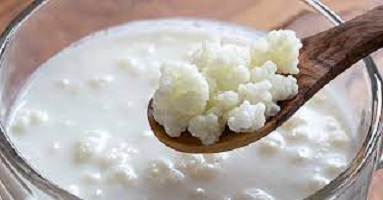Kefir: Meaning, Health benefits, Dangers, and Recipe
Kefir: Meaning, Health benefits, Dangers, and Recipe

Kefir is a probiotic beverage that includes up to 30 different strains of good bacteria and a variety of bioactive substances.
These probiotics, like lactic acid bacteria, have been shown to improve a variety of digestive problems as well as immune function, and combat cancer-causing agents, and dangerous germs.
What Is Kefir?
Kefir is a milk-based beverage that is fermented using “grains” called starters, which are actually a mix of yeast and bacteria.
It originated from the Caucasus Mountains in Eastern Europe and is derived from the Turkish term keyif, which means “feeling pleasant.” The mixture’s efficacy and potent effects started to spread throughout the tribes.
Russian doctors eventually discovered it and exploited it to treat diseases like tuberculosis in the 19th century after learning of its renowned healing properties.
Almost any type of milk, including goat, sheep, cow, soy, rice, or coconut milk, can be used to make this beverage. Even coconut water may be used to make it.
Types of Kefir
- Cow’s milk kefir
- Water kefir
- Goat’s milk kefir
- Coconut water kefir
How to Make Kefir
Kefir can be produced at home. To perform this, one will want a sterile setting and tools to stop the improper kinds of bacteria from entering the liquid.
To start, one will require:
- Active kefir grains
- Milk: goat, cow, or coconut milk
- A rubber band,
The steps are as follows:
- Firstly, wash hands thoroughly with soap and warm water
- Then, wash the jar with hot, soapy water to sterilize it.
- When completely dry, pour milk into the glass jar and allow air-drying upside down on a clean drying rack.
- For each cup of milk, combine 1 teaspoon of kefir grains.
- Ensure there is room at the top because the liquid will swell as it ferments.
- Use the coffee paper to cover the container.
- Add a filter and then fasten it with a rubber band.
- For 12 to 48 hours, keep the jar in a warm location at about 70°F (21°C).
- If the liquid begins to separate, shake the jar gently and keep it out of direct sunlight.
- When the liquid has reached the desired texture, filter it through a mesh strainer into a sterile storage container.
- Lastly, store in the fridge for up to a week with a tight cover.
Kefir will be sweeter if the fermentation process is shorter; a longer fermentation will result in a tarter beverage.
The kefir grains that people collect in the strainer can be saved and used in their subsequent batches of kefir.
How to Drink Kefir
Kefir is a nice complement to your everyday diet, but you can also use it to make quick, nutritious salad dressings.
There is even a kefir meal, called okroshka, which is prepared in Eastern Europe from beetroot, cucumber, dill, and kefir.
This dish is a delicious way to incorporate this healthful beverage into your diet.
How to use kefir ~ Uses of Kefir
Kefir can be consumed similarly to milk and plain yogurt. Try:
- Sipping it cold in a glass
- Drizzling on cereal, oats, or muesli
- Incorporating into smoothies; and/or consuming fruit
Kefir can also be used in:
- Baked products, soups,
- Iced yogurt, and
- Creamy salad dressings.
Boiling the kefir will inactivate the active microbes.
Nutritional Value of Kefir
Depending on the ingredients and fermenting process, kefir’s nutritional content and the probiotic bacteria it contains might vary greatly. In traditional milk kefir, there are approximate:
- 90% water
- 160 calories
- 12 grams carbohydrates
- 10 grams protein
- 8 grams fat
- 390 milligrams calcium (30 percent DV)
- 5 micrograms of vitamin D (25 percent DV)
- 90 micrograms of vitamin A (10 percent DV)
- 376 milligrams potassium (8 percent DV)
- 6% natural sugars
- Vitamins B
- Vitamin C and
- Magnesium
Kefir Milk
The most popular and commonly accessible type of fermented milk beverage is milk kefir, which is typically sold in almost all health food stores and most large supermarkets.
The most common milk used to make this type is the goat, cow, or sheep milk; however, some retailers now sell coconut milk kefir, which implies it doesn’t contain any lactose, dairy, or actual “milk” at all.
Although milk kefir isn’t particularly sweet on its own, various flavors can be added to it to enhance the flavor and improve its attractiveness.
When making kefir at home, you can add raw honey, maple syrup, vanilla extract, or organic stevia extract to sweeten and flavor it. Most store-bought kefirs are flavored with additions like fruit or cane sugar.
Benefits of Kefir Milk
The benefits of kefir milk for weight loss can only be enjoyed when kefir is used in moderation. Other benefits include:
- Appropriate for lactose-sensitive people;
- Preventing tooth decay and maintaining good oral health
- Reducing inflammation in healthy individuals
- Improved digestion and constipation relief
Kefir Water
Water kefir is dairy-free kefir that is acceptable for those who are lactose intolerant or adhere to a dairy-free diet, such as veganism or paleo.
You cannot begin a water kefir culture with milk kefir grains because aqua kefir grains have a different bacterial profile.
Popular varieties of water kefir include those made with fruit juice and coconut water, but you may also make it simply with water and sugar.
Benefits of Kefir Water
You should utilize water kefir in a different way than milk kefir. Toss it into nutritious sweets, porridge, salad dressing, or just drink it straight.
It’s not the ideal dairy product substitute because it lacks the creamy texture and tartness that dairy products have.
Kefir vs. Yogurt
Both kefir and yogurt are made from milk that has been fermented with good bacteria, which makes them quite similar. They share similar nutritional profiles, including a fair amount of protein, and have a low-fat content.
Most people pick yogurt as their preferred source of probiotics. It’s one of the most well-known probiotic sources available. In comparison to yogurt, kefir grains actually have more than 60 different species of bacteria.
This implies that your body benefits from a wide range of probiotics, giving you a better chance of getting the nutrients that are ideal for you.
Benefits and Side Effects of Kefir
Kefir is good for eating and for topping other dishes.
It could be used to improve health and diet; individuals who are lactose intolerant might be able to drink some kefir without experiencing any problems, so long as it is manufactured and stored safely.
Kefir should not be consumed by those who are allergic to milk unless it contains non-dairy milk. Diabetes sufferers should read labels carefully and stick to simple varieties without added sugar.
Health Benefits of Kefir
The extraordinary health benefits of kefir extend beyond digestion; these benefits have an impact on your immune system, heart, and inflammation, among other body systems.
Some of the health benefits are listed below:
- The bacteria in kefir can aid with digestive issues and may help prevent cancer.
- Reduces the symptoms of lactose intolerance
- Kefir is beneficial for allergic responses
- Kefir could improve bone health.
- Kefir can be good for your dental health.
- Kefir has some antimicrobial properties.
- Kefir is excellent for menstrual periods.
- Kefir can aid in weight control
- Kefir is a great protein source.
- Has probiotics that can strengthen immunity
- Promotes Good Skin Health
Side Effects of Kefir
Dietitians advise starting with 1 cup per day when introducing kefir to your diet because it is generally safe to drink. Otherwise, a high rise in probiotics might result in:
- Uncomfortable stomach issues; such as bloating
- Could increase the susceptibility of persons with compromised immune systems to infection
- Nausea
- Diarrhea
Frequently Asked Questions
What is the difference between kefir and yogurt?
Both are typically prepared using a starter kit of “live” active yeast, which is in charge of cultivating the advantageous bacteria.
Kefir, unlike yoghurt, only comes from mesophilic strains and is cultured at room temperature with no heating involved. Despite their numerous similarities, kefir typically contains more probiotics and a wider variety of bacterial and yeast strains.
How much kefir to drink for weight loss?
There is no certain quantity of kefir to consume in order to lose weight.
Use kefir as a supplement to a balanced diet rich in plant-based foods to nourish your body and your gut microbiome rather than focusing on it as a weight loss strategy.
Is it safe to make kefir at home?
Definitely! When fermenting at home, it’s crucial to carefully follow the recipe directions because the food can rot and become unhealthy to eat if the fermentation process is carried out at the wrong temperature, for an extended period of time, or on unsterile equipment.
Is it safe to drink kefir every day?
To maximize the health advantages of this potent beverage, most sources advise aiming for roughly one cup each day. It is ideal, to begin with, to lower the dosage and gradually increase it to the appropriate level.
Does kefir cause weight gain?
As long as you incorporate it within a generally balanced diet, it shouldn’t be harmful on its own. Due to its high nutrient content, it might potentially improve weight loss or weight maintenance.
As a result, pick varieties that are unsweetened and low in sugar to get the greatest advantages and consume the fewest unnecessary calories.
Is kefir good for stomach upset?
Kefir tastes finest when consumed in the morning on an empty stomach. As a result, digestion and gut health are enhanced.
What are the benefits of kefir for the skin?
- Glide dry skin at night in order to give the active microbes a full 8 hours to complete their work,
- Reduce rosacea or redness.
- Skin Exfoliator
- Balances Skin PH
- Relieves fine wrinkles and dullness
- Calms stressed-out skin
- Brightens a tired face
- Reduces acne
Is there a best time to drink kefir?
There is no scientific evidence to support whether kefir is better consumed in the morning or at night for health reasons.
However, it’s important to remember several proven methods that can aid in achieving and maintaining healthy body weight as well as general health.
What does kefir do to your body?
According to studies, it strengthens your immune system, helps with digestion issues, enhances bone health, and may even fight cancer.
Is it good to drink kefir every day?
The consumption of 1-3 cups (237-710 ml) of kefir each day can be a wonderful method to increase your probiotic intake.
People with diabetes, autoimmune diseases, and those on low-carb or ketogenic diets may all need to restrict their intake.
How much kefir should I drink a day?
Although it is entirely up to you, for the best probiotic health we advise consuming one to two 8-ounce cups of kefir daily.
Kefir affects people differently, so experiment with your serving size to find what works for you. Some people just consume a few ounces of liquid each day, while others consume 32 ounces or more!
Does kefir make you gain weight?
Protein-rich foods like kefir make you feel fuller for longer. However, consuming too much kefir might impede or even reverse weight reduction.
Will kefir make you poop?
Kefir consumption has been linked to an increase in bowel movements in those who are constipated, according to a preliminary study. It also appears to make stools softer.
How long does it take for kefir to work in the body?
Kefir may take two to four weeks to boost health. Therefore, for best benefits, one should drink 1-2 cups of kefir daily.
Which is better kombucha or kefir?
Kombucha and kefir both have beneficial germs, but kefir has a higher concentration of lactic acid bacteria (LAB).
As a result, kefir might be thought of as a liquid probiotic supplement and kombucha as more digestive help. Another significant distinction is that because kombucha is created from tea, it frequently contains caffeine.
Is kefir anti-inflammatory?
Kefir diets have anti-inflammatory effects by reducing the production of cytokines that cause inflammation, including IL-1, TNF-, and IL-6. It would be wise to use kefir (and its byproducts) to prevent COVID-19 patients from expressing proinflammatory cytokines.
Is kefir good for your skin?
Kefir is more than just a nutritious beverage. Because of the probiotics and naturally occurring Alpha-Hydroxy Acid, it also makes a good, nutritious face mask for any skin type (AHA).
Who should not drink kefir?
Kefir consumption should be avoided if you have a severe, potentially fatal milk allergy because it can trigger serious allergic responses. If you have a milk allergy.
You can still consume kefir if it is made with a non-dairy “milk” like rice milk.
Does kefir help you sleep?
The best food supplement for sleep is goat’s milk kefir, which contains tryptophan and live microorganisms to assist your gut flora. Therefore, in order for your body to make enough serotonin for you to sleep comfortably, you need to eat “tryptophan meals.”
How long does kefir last in the fridge once opened?
3 – 5 days
If properly stored, homemade kefir should remain fresh for two to three weeks.
Is kefir good for your liver?
After much research, it was known that kefir improved fatty liver syndrome for body weight, energy expenditure, and basal metabolic rate.
The results also showed that by inhibiting serum glutamate oxaloacetate transaminase and glutamate pyruvate transaminase activities and by lowering the triglyceride and total cholesterol contents of the liver.
Which is better kefir or yogurt?
Kefir has more probiotics than yoghurt, which is the main nutritional difference between the two..
Is kefir better than probiotic pills?
Probiotic tablets frequently become stuck in the stomach’s acids, where they are destroyed before the body can use them. So it is much more effective to consume probiotic foods like kefir, kombucha, and cultured veggies than to take pills.
How can I tell if my water kefir grains are working?
- Color: During the 48-hour culturing procedure, the liquid’s color will change.
- Flavor: After 48 hours of culture, the final product should taste less sweet than the sugar water you started with.
Is kefir good for the colon?
Kefir may help the large intestine maintain a healthy bacterial balance, enhance lactose digestion, and possibly even improve stool consistency.
Is kefir good for acid reflux?
Consuming a probiotic beverage on a daily basis may alter gut flora and lessen symptoms of heartburn and reflux.
Is water or milk kefir better?
Milk kefir comes out on top when it comes to the sheer range of those bacteria and yeasts. It can contain up to 56 distinct strains, according to research.
According to other studies, ordinary water kefir only contains up to 14 distinct bacterial and yeast strains.
Is kefir acidic or alkaline?
Kef is an acidic-alcoholic fermented milk product. It has a mildly acidic flavor and a creamy consistency.
Is kefir good for joints?
Our findings suggest that kefir peptides may prevent ankle joint bone degradation and have an anti-inflammatory impact. This study supported the notion that kefir peptides hold promise as a rheumatoid arthritis treatment.
Is kefir good for kidneys?
Some findings support the idea that kefir supplementation may help to reduce oxidative stress, which is linked to improved renal function and may help to halt the course of diabetic nephropathy.
Is kefir good for the lungs?
Kefir peptides improve overall SOD activity in the lungs while decreasing ROS levels, NF-B activation, proinflammatory cytokine secretion, and inflammatory cell infiltrates.
Is kefir anti-aging?
Kefir milk includes alpha hydroxy acids (AHAs) in the form of lactic acid, which is similar to fruit-derived enzymes.
This indicates that cleaning, exfoliating, and moisturizing with the “mystery magic milk” will gently remove dead skin cells, reducing the visibility of wrinkles and dissipating age spots and freckles.
Does kefir make you fart?
Kefir could make some people feel uncomfortable, mainly in the form of more gas. Others might find that it greatly reduces their bloating and gastric discomfort.
Does kefir interact with medications?
The likelihood of contracting a bacterial or yeast infection can rise if you use medications that suppress the immune system. Combining kefir with immune system suppressing drugs may make you more susceptible to illness.
When should I drink kefir at night or morning?
In theory, you can have kefir whenever you like. Due to the fact that it is an energy booster, we often advise taking it first thing in the morning rather than last thing at night.
Can kefir help with anxiety?
Science suggests that the live bacteria in kefir may also be beneficial.
According to a review of studies printed in the journal General Psychiatry, people who suffer symptoms of anxiety may benefit from adopting actions to control the microbes in their gut using probiotic food.
Does kefir lower your blood pressure?
Drinking kefir, probiotic fermented milk that helps keep the proper balance of healthy bacteria in the digestive tract, may lower blood pressure.
Why is my milk kefir slimy?
There are a variety of reasons why water kefir can get slimy; either too many or not enough nutrients.
Why is my kefir fizzy?
Two of the yeasts used to manufacture kefir, Saccharomyces kefir, and Torula kefir, ferment lactose into a little quantity of alcohol and carbon dioxide, which causes carbonation.
CONCLUSION
Probiotics, vitamins, and minerals abound in kefir. According to studies; kefir can enhance health when used frequently (often every day for 2-4 weeks).
Probiotics are healthy bacteria and yeast that are already present in your body and are known to naturally enhance a number of aspects of your health.
Since they are produced naturally by the body, they have a particularly positive effect on the body. To maximize the health advantages of kefir, choose reputed sellers of premium, fresh grains because the quality of your kefir depends on the quality of the grains.



Pingback: Popular Russian Food Dishes Everyone Should Try - 9jafoods